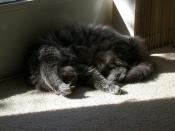An exploration of selected texts, Huckleberry Finn (HF) by Twain, Wild Cat Falling (WCF) by Johnson and Twelve Angry Men (TAM) by Rose, reveal common themes that are of universal interest. All texts raise the issue of racial prejudice. In HF Twain uses the naïve narrator, Huck, to reveal the racial discrimination that is a socially disease. Similarly, in WCF, Johnson criticises the discrimination of the whites towards the Aborigines. It is clear that all composers are critical of the racial attitude of many prejudiced people in society. Another common theme is injustice. However, this theme varies according to the text. In HF and WCF the injustice is evident towards the black race. In WCF, injustice is demonstrated by the prejudiced attitudes of the jury.
The selected texts raise the universal issue of prejudice. In the novel, Huckleberry Finn, Twain demonstrates social prejudice of the white society towards the slaves.
Aunt Sally typifies the Southern attitude towards the slaves when she responds to Huck's comment that nobody had been killed except for "a nigger": "Well it's lucky, because sometimes people do get hurt". It seems that the blacks are not perceived as human beings, simply as slaves to be exploited. Similarly, in Wild Cat Falling, Johnson criticises white discrimination and prejudice towards the blacks through the protagonist, who makes a wry comment on the behaviour of whites towards blacks: "Funny how they oil themselves over and bake to achieve the despised colour I was born with." In the play, Twelve Angry Men prejudice towards the lower class is demonstrated through the 4th Juror, who comments: "Slums are breeding grounds for criminals". This sweeping statement enrages the 5th Juror, who was raised in a slum himself and he responds ironically: "I've lived in a slum all my life. I nursed...


